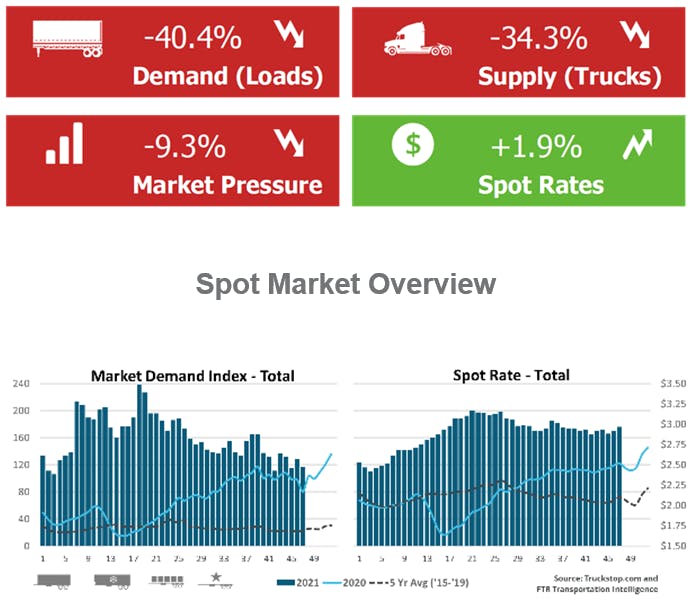Trucking news & briefs for Nov. 29, 2021:
COVID-19 HOS waiver for haulers of certain commodities extended
The Federal Motor Carrier Safety Administration is extending the COVID-19 emergency declaration, which waives Part 395.3 (maximum driving time) of the Federal Motor Carrier Safety Regulations for carriers providing emergency relief related to the pandemic. The declaration, which was set to expire Tuesday, Nov. 30, will now be effective through Feb. 28, 2022.
The extension continues to retain new features instituted with the last extension that began in September, including the narrowed regulatory range of the exemption -- which notably does not include the requirement to log time or use an ELD, if applicable. The September changes also included a new request for carriers to report their use of the exemption within 5 days after the end of each month. The move to add that requirement followed the agency's request in late summer to study the extent of the exemption's use around trucking. The reporting page asks for carriers' USDOT number; the number of trips made by commercial vehicles under the COVID Declaration; the type of goods transported; and for multiple goods transported, an indication of which commodity was transported the most.
Carriers are able to report by accessing their portal accounts via Portal.FMCSA.DOT.gov/login. After logging in, carriers will need to access "Emergency Declaration Reporting" under the "Available FMCSA Systems" section of the page.
[Related: FMCSA hoping to study the extent of COVID HOS waiver use]
The agency said it decided to extend the declaration because, “although the number of COVID-19 cases began to decline in the U.S. following widespread introduction of vaccinations, persistent issues arising out of COVID-19 continue to affect the U.S., including impacts on supply chains and the need to ensure capacity to respond to variants and potential rises in infections. Therefore, a continued exemption is needed to support direct emergency assistance for some supply chains."
The hours waiver applies to drivers and carriers providing direct assistance, which means transportation and other relief services related to the immediate restoration of essential services (such as medical care) or essential supplies related to COVID-19 during the emergency.
The waiver continues to be limited to the transportation of:
- Livestock and livestock feed
- Medical supplies and equipment related to the testing, diagnosis and treatment of COVID-19
- Vaccines, constituent products, and medical supplies and equipment including ancillary supplies/kits for the administration of vaccines, related to the prevention of COVID-19
- Supplies and equipment necessary for community safety, sanitation, and prevention of community transmission of COVID-19 such as masks, gloves, hand sanitizer, soap and disinfectants
- Food, paper products and other groceries for emergency restocking of distribution centers or stores
- Gasoline, diesel, jet fuel, and ethyl alcohol
- Supplies to assist individuals impacted by the consequences of the COVID-19 pandemic (e.g., building materials for individuals displaced or otherwise impacted as a result of the emergency)
[Related: COVID hours exemption not valid 'just because you're hauling food']
Direct assistance does not include non-emergency transportation of qualifying commodities or routine commercial deliveries, including mixed loads with a nominal quantity of qualifying emergency relief added to obtain the benefits of this emergency declaration. To be eligible for the exemption, the transportation must be both of qualifying commodities and related to the immediate restoration of those essential supplies. Read the full exemption language via this link.
[Related: The COVID-19 HOS waiver: Has 'self-regulation' equated to better safety?]
 Spot market during Thanksgiving week -- typical patterns in evidence | A sharp drop in spot market volume during Thanksgiving week is a given, so the 40.4% decrease in load postings in the Truckstop.com system during the week ended November 26 does not signal anything remarkable, Truckstop.com and FTR said with its weekly Market Demand Index report. In recent years, volume declines during Thanksgiving week have ranged from about 36% to 42%. Meanwhile, spot rates rose on the strength of the largest week-over-week gain in dry van rates since May. Rate increases are typical during Thanksgiving week as truck capacity dries up.
Spot market during Thanksgiving week -- typical patterns in evidence | A sharp drop in spot market volume during Thanksgiving week is a given, so the 40.4% decrease in load postings in the Truckstop.com system during the week ended November 26 does not signal anything remarkable, Truckstop.com and FTR said with its weekly Market Demand Index report. In recent years, volume declines during Thanksgiving week have ranged from about 36% to 42%. Meanwhile, spot rates rose on the strength of the largest week-over-week gain in dry van rates since May. Rate increases are typical during Thanksgiving week as truck capacity dries up.
from Overdrive https://ift.tt/3I3aDMI



Sourced by Quik DMV - CADMV fleet registration services. Renew your registration online in only 10 minutes. No DMV visits, no lines, no phone mazes, and no appointments needed. Visit Quik, Click, Pay & Print your registration from home or any local print shop.

No comments:
Post a Comment